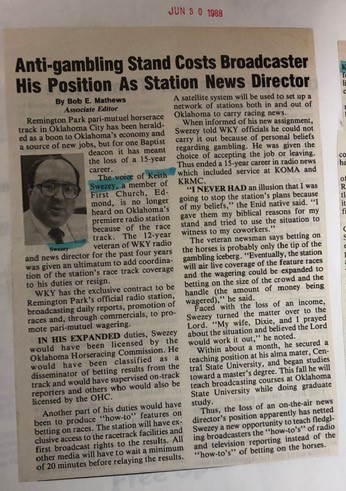
by Brian Hobbs | Aug 14, 2019
The late, great preacher Adrian Rogers once said, “Your reputation is your actions. Your character is your reactions.” Today, social media rewards reactions. The rawer the reaction, the more likes and shares you might get, giving rise to the popular term “Hot take.”
Unfortunately, the raw and rancorous reactions we see every day on social media are revealing major character flaws, even among Christians. How can we rise above this? Here’s three ideas:
- Wait. The Bible says, “Do you see a man who is hasty in his words? There is more hope for a fool than for him” (Prov. 29:20). The next time a hot topic arises, or breaking news happens, just wait. Don’t chime in the minute you think of something. Just mull over what you want to say. Then later, come back to it to see if you still want to comment or what you want to say.
- Withhold. The prevailing thought on social media is “silence is agreement.” If you do not immediately comment on every given issue, you are somehow viewed as complicit. The Bible, meanwhile, teaches us there is “a time to be silent and a time to speak” (Eccl. 3:7). Moreover, the Bible praises a person who learns to hold his or her tongue (Prov. 21:23). If you simply do not comment on every issue that comes up online, the World Wide Web will go on. It’s sometimes okay to withhold from reacting.
- Swap. If your reactions are revealing a character weakness, God can help you replace that original emotive reaction with wisdom. Ask Him to change your heart; ask Him to give you wisdom where weakness now resides. If we learn from Jesus, we will learn to take everything to the LORD in prayer.
With
the 2020 elections looming, the raucous social media discussion is likely to
get worse, not get better. That means if our reactions in the coming months are
marked by wisdom, not weaker impulses, the world may just notice the difference
in us. People may see that Christ is Lord over all, even our reactions.

by Chris Doyle | Aug 9, 2019
Greetings!
Al Mohler’s “The Briefing” podcast is back, after taking the
month of July off. The president of Southern Seminary has tackled some serious
cultural issues in these early days of August. For this week’s DHD I’ll
highlight some of Mohler’s commentary from The Briefing but also from a
fascinating article he wrote, mentioning one of my favorite political
commentators.
1. Mohler on
Religious Liberty
I start with Mohler’s article “Is
Religious Liberty Truly In Peril?” He addresses a published debate recently
provided by the Wall Street Journal.
The debate features law professor Marci Hamilton and David French, whom I greatly
appreciate.
Both French and Hamilton discuss the status of religious iberty
in our country. As Mohler describes, Hamilton depleting religious liberty as
merely “your individual, private thoughts,” which cease to be protected “once
those thoughts enter the public square.”
French points out that religious liberty has been in peril
for years, and Christian leaders have known about legal activists at all levels
of government who have been expanding “their regulatory and ideological attacks
on religious liberty.”
The most fascinating take on the exchange between French and
Hamilton involves the Religious Freedom Restoration Act (RFRA) of 1993, which
was greatly supported by President Bill Clinton as well as other Democrat
leaders in Congress. Now, Hamilton states RFRA is legislating an “extreme” new
understanding of religious freedom.
Mohler’s commentary on this is excellent and should not be
missed:
“What changed in the last 25 years? The culture changed. The
culture that once honored religious liberty and respected it as a bedrock
freedom for civil society—that culture is no more. Religious liberty now
attracts the glare of the cultural left who see religious liberty as an
obstacle in the path of their social transformation. They view this freedom as
a socially-constructed institution of bigotry from which we must liberate
ourselves. Moreover, the rise of the LGBTQ movement now pits religious liberty
against the newly constructed sexual liberty—these are two, incompatible
freedoms that necessarily collide. The sexual revolution believes it’s time for
religious freedom to give way to its higher, newer, morally coercive ‘rights.’”
Mohler concluded his article giving warning about the
current Democratic presidential candidates who if any of them would get elected
will undoubtedly “dismantle religious liberty, with even greater hostility and
ferocity.”
2. Mohler on
California school curriculum
The next two topics baffle my mind. Check out Tuesday, Aug. 6 edition
of The Briefing and hear Mohler report on the State of California’s new
Ethnic Studies for high schools.
I’m actually impressed that Mohler was willing to read the
entire curriculum. His conclusion was this new Ethnic Studies that will be
taught in the highest populated state in America is “an absolute agenda for
transforming the United States of America into a very different country, a very
different culture.”
I’m also impressed on how well Mohler pronounced a few of
the original terms with rather unique spellings found in this curriculum.
Here’s my favorite takeaway from Mohler’s assessment of
California’s Ethnic Studies:
“We’re living in a post-modern world in which people can
come up with their own truth and demand that that truth be respected in almost
any circumstance, now even including spelling. The State Board there in
California is coming up with its new spellings requiring its new glossary. Why
would students not be able to do the very same thing?”
By the way, even the Los
Angeles Times found this new study to be ridiculous.
3. Mohler on personal
pronouns
Last Friday, Aug. 2,
Mohler addressed other recent unconventional approaches to the English
language. I’m not going to mention all that he covers because the grammar enthusiast
in me gets too aggravated when even thinking about it.
Mohler reports that a New
York Times columnist wants to do away with gendered singular personal
pronouns and only use “They” to modify both singular and plural nouns. I did
enjoy reading the explanation, even though I found it totally ridiculous.
“Our responsibility, according to the Christian worldview,
is to order our language so as most faithfully to correspond to the reality
that God has created,” Mohler said. “This is a moral responsibility. It’s a
theological responsibility. It’s also just a natural impulse because human
beings, made in the image of God, given the gift of consciousness, given the
gift of language, we desperately do want our language to make sense and to be
communicable, one to the other, understandable to those to whom we speak or
write or communicate. If our language, if our vocabulary becomes detached from
reality, it becomes not only less linguistically useful, it becomes subversive
of the very idea of communication.”
I will say this Briefing is one of Mohler’s all-time best.
4. Journalists and
abortion
Peggy Wehmeyer gives an excellent commentary in the Dallas Morning News on journalists
covering abortion issues with impartiality.
I enjoyed reading the whole article, but here’s my favorite
part:
“If evangelicals heard their
moral angst over abortion clearly articulated in the media, I’m convinced
they’d be far less likely to consider journalists their enemies.”
Thanks Peggy! I hope your message doesn’t fall entirely on
deaf ears.
5. Importance of
asking questions
Another good, thought-provoking article I read this week is
by Helena Sorenson, “The
God Who Asks.”
I’m still mulling through some of the contents of Sorenson’s
article, but for the most part, I like how she presents God wanting to be
relational and His method of asking questions.
“Isn’t it fascinating that an
omniscient God, the God who knows us inside and out, should be so determined to
ask questions? Turn to any passage of Scripture, Old Testament or New, and there’s
a good chance you’ll catch Him in the act. In the Gospels, for example, Jesus
is always walking up to someone with an obvious malady, an obvious need, and
asking, “What do you want?” He makes no assumptions. Whatever information He’s
gained through observation or revelation, He never misses an opportunity to ask
a good question. Jesus honors the suffering people He encounters by allowing
them to voice their feelings and desires. In person. Face to face. He is
relentless in His pursuit of genuine relationship.”
6. God and weather
As I was trying to come up
with my final topic, I turned to what was a rather unexpected rain shower this
morning, which came right in the middle of a stretch of hot 100-degree days.
It made me think of Jerry Bridges’ book “Trusting God: Even When Life Hurts” and his chapter “God’s Power Over Nature.”
Here’s a challenging quote from
Bridges:
“Complaining about the
weather seems to be a favorite American pastime. Sadly, we Christians often get
caught up in this ungodly habit of our society. But when we complain about the
weather, we are actually complaining against God who sent us our weather. We
are, in fact, sinning against God (See Numbers 11:1). Not only do we sin
against God when we complain about the weather, we also deprive ourselves of
the peace that comes from recognizing our heavenly Father is in control of it.”

by Michael Foust | Aug 9, 2019
The live-action Nickelodeon movie ‘Dora and the Lost City of Gold’ opens this weekend, telling the story of the popular fictional character from the animated educational series ‘Dora the Explorer.’
Dora is an optimistic and outgoing teenager girl who has
spent her entire life in the South American jungle.
She’s played with snakes. She’s talked to monkeys. She’s
swung from branch to branch, exploring everything there is to see. She loves it there.
But things are about to change. Her mother gets a new job.
And then Dora moves to an environment—California—she doesn’t recognize or
understand. And then she enters high school, a cynical place where teenagers
definitely don’t share her bubbly
outlook on life.
Will Dora be able to influence her high school classmates
for the better? Or will her classmates change her?
The live-action Nickelodeon movie Dora and the Lost City of Gold (PG) opens this weekend, telling the
story of the popular fictional character who is best-known from the animated
educational series Dora the Explorer.
It stars Isabela Moner (Instant Family)
as Dora, Eva Longoria (Dog Days) as
her mother and Michael Peña (Ant-Man
series) as her father.
The movie follows Dora as she navigates high school—going to
class (she loves literature), eating in the cafeteria (mac & cheese is her
favorite) and dancing awkwardly at the school dance—before she and three
classmates are kidnapped and taken back to South America. It seems Dora’s
parents knew the location of a lost city of gold, and the bad guys want Dora to
lead them to her mom and dad.
Dora and the
Lost City of Gold
includes elements from several great films: the hilarious naivety from Elf, the contagious optimism in Paddington, and the history-based
exploration from Raiders of the Lost Ark.
It’s a clean version of Jumanji: Welcome
to the Jungle (which I didn’t like).
It also provides girls a great role model who has multiple
qualities I’d want my daughter to emulate.
Yes, the film is quirky and even goofy at times, but it’s a
funny and mostly family-friendly film that my two oldest children (ages 11 and
7) enjoyed.
Warning:
minor/moderate spoilers!
(Scale key:
none, minimal, moderate, extreme)
Violence/Disturbing
Minimal. Teenagers are kidnapped in a crate and taken to
South America on a plane. Dora and her classmates are chased and shot at with
darts. They get stuck in quicksand. They nearly drown, and they think they’re
going to die. They’re nearly killed again in a temple when the walls close in
on them and a ceiling with sharp points collapses. But nothing is graphic, and
comedy is just beneath the surface of every scene. It would disturb only the
most sensitive children. Most older kids and tweens would consider it tame.
Sexuality/Sensuality/Nudity
Minimal. Two teenagers kiss (Dora’s not one of them). We
hear discussion of animals mating.
Coarse
Language
Minimal. Two barely heard OMGs. Two instances of “gosh” and
two unfinished “what the.” Four instances of “shut up.” The rest of the
language involves name-calling: “disco Dorka” and “Dorka,” for example.
Other
Positive Elements
Dora loves her parents, and they love her, too.
Dora is the type of female role model few films offer. She
optimistic. She’s encouraging to others. She sees the best in people. She’s
humble. She’s a leader who learns. Eventually, she wins over her friends. It’s
also worth noting that the film doesn’t sexualize Dora, as happens too often in
Hollywood movies.
Other Stuff
You Might Want To Know
Dora dances, but not inappropriately (It’s so goofy it embarrasses
her cousin, Diego).
She and her friends get stuck in quicksand, resulting in
sounds that emulate the sound of flatulation.
Her female classmate, Sammy, uses the restroom in the
jungle. Dora helps by digging a hole and inventing a song about making a “poo
hole” in the ground.
Life Lessons
Optimism is
infectious: Dora
was ridiculed in school for her cheery personality, but it influenced everyone
for the better. The contrast between her and her snobby classmates is striking.
Who would you rather hang out with? The answer is obvious.
Bullying is
ugly: We
briefly see a student shoved up against the lockers. We hear Dora called
several ugly names for her intellect and background. The bullies were trying to
be cool. Ironically, through, they were the ones who looked foolish. Proverbs
18:2 says: “A fool takes no pleasure in
understanding, but only in expressing his opinion.”
Everyone
needs encouraged. Dora
grows discourages a couple of times. Her friends, especially Diego, cheer her
up.
Worldview
The plot involves Incan traditions and myths that turn out
to be true. We watch an elderly woman transformed into a young queen. We hear
discussion of Incan gods. When things go bad, the queen tells everyone that the
gods were “angered.” We watch Dora appease these gods by restoring a statuette
to its original location.
What Works
Isabela Moner as Dora. She’s marvelous. The humor stays in
the family-friendly realm, even if it does include discussions of “poo.”
What Doesn’t
Some of the humor is awkward.
Discussion
Questions
1. Do you enjoy being around people like Dora? Why or why
not?
2. Name five positive characteristics of Dora. Which
characteristic do you need to emulate?
3. What is the key to stopping bullying?
4. Why are cliques so popular? Are cliques biblical or
unbiblical?
5. Dora says if “you believe in yourself, anything is
possible.” Is that true?
Entertainment rating: 3.5 out of 5
stars. Family-friendly rating: 4 out
of 5 stars.
Rated PG for
action and some impolite humor.

by Brian Hobbs | Aug 8, 2019
There’s a story shared about the famous Roman
historian Edward Gibbon who, though he was a Member of Parliament in Britain
for a number of years, he never once gave an address or speech. When asked why,
he said the examples of the good speeches and bad speeches deterred him from
doing so.
As I see social media posts and discussion
these days, I do see a number of really good posts. Meanwhile, I see a much
greater number of terrible posts, ranging from rancorous political discussions
to vicious back-and-forth personal attacks. Like Gibbon, the examples of the
good and bad comments and posts have deterred me from saying much.
About 10 years ago, popular author
and pastor John Piper wrote a piece called “Why and How I am Tweeting,” which has both
informed and haunted me ever since I first read it. Piper said this:
“I see two kinds of response to social
Internet media like blogging, Facebook, Twitter, and others. One says: These
media tend to shorten attention spans, weaken discursive reasoning, lure people
away from Scripture and prayer, disembody relationships, feed the fires of
narcissism, cater to the craving for attention, fill the world with drivel,
shrink the soul’s capacity for greatness, and make us second-handers who
comment on life when we ought to be living it. So boycott them and write books
(not blogs) about the problem.”
Piper continues, “The other response says:
Yes, there is truth in all of that, but instead of boycotting, try to fill
these media with as much provocative, reasonable, Bible-saturated, prayerful,
relational, Christ-exalting, truth-driven, serious, creative pointers to true
greatness as you can.”
I agree with Piper’s diagnoses. In fact, all
of the negative consequences he predicted 10 years ago have come true—and even
worse consequences than Piper or any of us could have imagined today. Meanwhile,
I tried to operate by his prescription to try to redeem social media, but it is
getting increasingly difficult to do so.
That is why I know many people who once were
enthusiastic participants on social media but now have walked away altogether.
I applaud them for taking this bold step, and part of me envies the more
peaceful life they must enjoy as a result.
While I don’t (often) tweet or post nowadays,
I do give the issues at hand much thought. And while I long for a day in which
social media becomes a more civilized and uplifting platform for discussion, I
am afraid that I don’t see that happening any time soon. If we ever do turn a
corner, though, and social media becomes a more grace-filled place, maybe I can
tweet about that.

by Brian Hobbs | Aug 5, 2019
On any given day, when you look at social media, it can be
discouraging. You see people arguing over politics on Facebook. We read vicious
back and forth comments on Twitter. You see mocking videos on YouTube.
You can kind of see it all on social media. The one thing
that is hard to find on social media, though—the one missing ingredient—seems
to be grace. It is easy to tell a gracious person from an ungracious person,
and unfortunately, social media is showing the worst side of many of us.
I once attended a wedding at which the minister said to the
bride and groom, “You may not remember much I say today. In fact, you may
forget just about everything that is said today. But please just remember this
one word from today for the sake of your marriage: grace.”
The Bible says Jesus came “full of grace and truth” (John 1:14). It is easy to find so-called
truth tellers on social media nowadays. It is much harder to find people full
of truth and grace. As Christians, we can do better than this. We should do
better than this.
If people are going to hear over-the-top rhetoric or
infighting, let it not come from followers of Jesus Christ. Because a lack of
grace suggests a lack of walking with Jesus Christ in our life.
Now that I think of it, the one truly missing ingredient on
social media most days may be the One we call Savior and Lord. The missing
ingredient may be Jesus Himself. And that, brothers and sisters, is a recipe
for disaster.
Today, let’s do better. Today, let’s each be more like
Jesus; let’s show one another grace.

by Chris Doyle | Aug 2, 2019
Greetings!
Another week, another DHD! Thanks for reading!
1. Comparing border
wall to Planned Parenthood
I read a peculiar article on the Christianity Today website. Titled “Are
We Morally Distressed By What Is Taking Place at the Border?” the article’s
author Sam Kim gives a rather intriguing comparison when writing his view about
those coming across the southern U.S. border.
Kim wrote, “(Evangelicals supporting) …funding for a wall is
the moral equivalent of those on the left who are advocating Planned
Parenthood. Both policies are catalysts for the loss of life that Scripture
commands us to protect. The unborn and those seeking asylum have an equal right
to life. What is the moral difference between killing and letting die, when the
ultimate outcome is the same?”
Speaking frankly, this comparison is too drastic and flawed.
There is enough support demonstrated at the border to disqualify his conclusion
of letting someone die who is near the border. It is possible to favor a border
wall AND offer care to those seeking asylum. There is no care of the unborn
when it comes to the abortion practices of Planned Parenthood.
I offer my own PP comparison involving Kim’s article. Just
like PP, the world’s largest abortion provider, never acknowledges the life of
the unborn baby, Kim never acknowledges the practices of exploitation of
children and families of the Cartels at the border.
I welcome Kim and others who share a similar view to read my
DHD
from last week, regarding the border crisis. Yes, the church should provide
care and support for those in need, especially those seeking asylum, under the
purpose of advancing the Gospel and furthering God’s Kingdom, but the
government should provide protection for citizens and maintain order. These
purposes of the church and the government can be practiced with no discord.
2. Swezey’s stand
A well-known broadcast leader in the Oklahoma City community
died earlier this week. Keith Swezey passed away on July 29 at the age of 67.
He is remembered by many in the broadcast journalism
business. I read many fond comments about Keith on Facebook. He also was
honored by news anchor Kerry Ogle on CBS affiliate KWTV News 9 in Ogle’s news
commentary “My 2 Cents.”
“A lot of broadcast
journalists have lost a mentor, but more than that Oklahoma lost a good man,”
Ogle said in his introduction.
Ogle also mentioned that
Keith stood “firm in his faith when given an ultimatum, knowing that it
would cost him his job as news director.”
To elaborate on what happened, in 1988, Keith was working at
WKY Radio when pari-mutuel gambling was on the rise with the addition of the
Remington Park horse track on the east side of Oklahoma City. WKY was given the
broadcast rights to cover the races and to promote the gambling wages at
Remington Park. As the news director, Keith was told by the station’s
management that he would be in charge of these reports. Keith refused to do
these duties, and WKY let him go.
The Baptist Messenger reported Keith’s departure at WKY in the June 30, 1988 edition.
Keith went on to teach at University of Central Oklahoma,
training broadcasting students. God bless Keith with the opportunity to
influence others.
I have known the Swezey family for years, as we are members
of the same church. I lift up Keith’s wife Dixie and his family during this
time of loss.
3. French on Harris
I got to be quick for the remainder of my topics.
Check out David French’s article,
responding to the Josh Harris’ fallout with Christianity. I was impressed to
see French share a powerful Gospel message on the National Review website.
“The indescribably good news is that from the moment of the
confession of faith, believers are not defined by their sin. They’re not
defined even by their own meager virtues. They’re defined by Christ,” French
wrote.
Please read the entire article and be blessed!
4. Born of water and
spirit
One of my favorite Bible passages in John 3, when Nicodemus
and Jesus meet. Don Carson wrote a great commentary on one of the most
challenging verses in the passage.
Check out Carson’s article “What
Does ‘Born of Water and the Spirit’ mean in John 3:5?”
5. Wilken on
daughters and suitors
Jen Wilken is a popular Bible teacher. Her article “On
Daughters and Dating: How to Intimidate Suitors” is a great read. Check it
out!
6. Finding a ‘black
friend’
The last article I share tells an encouraging story about
Mack Bronson and Sammy Little, two Texas pastors who are a great example of
racial reconciliation
Check out “Checklist
sparks friendship, opens ministry doors” and see how Little’s pursuit to
find a black friend in 1995 led to him befriending Bronson and making an impact
in southeast Texas.





